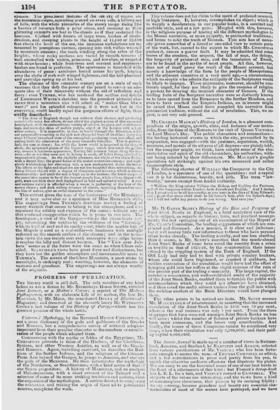Mr. D. GAVIN Sewer's History of the Rise and Progress
of Joint Stock Banks in England, is a brief analytical view of the while subject, as regards its history, laws, and practical manage- ment: the last springing out of an examination of the Report of Mr. Ceev's Committee, the leading suggestions of which are con- eiflered and discussed. As a manual, it is clear and judicious; but it will convey little new information to those who have perused other books already. The leading novelty, and one less startling than it seems, is Mr. Scores assertion that the much-abused Joint Stock Banks of issue have saved the country from a crisis as terrible as that of 1523-26, by the counteraction their issues offered to the crippling system of the Bank of England. If the Old Lady had only had to deal with private country bankers, whom she could have frightened, or crushed if stubborn, her sudden contraction of the circulation would have had the effect of bringing gold into her coffers at the slight expense of the ruin of time greater part of the trading community. The large capital, the extensive connexions, and well-esteblished credit of the majority of the Joint Stock Banks, enabled them to furnish the public with accommodation which they could not otherwise have obtained, and thus saved the really solvent traders from the gulf into which the reckless conduct of the Bank Directors would have plunged them.
The other points to be noticed are facts. Mr. SCOTT accuses Mr. MACCULLOCH of misstatement, in asserting that the increased circulation of the Joint Stock Banks in 1836 was 50 per cent., whereas the real increase was only a per cent. From the three stoppages that have occurred amongst Joint Stock Banks no loss will arise ; whilst the number of failures of private bankers have been more numerous, and the losses very considerable. And thrallr, the issues of these Companies cannot be considered very large, when their circulation was only 3,500,000/. and their paid- up capital 6,000,0001.


























 Previous page
Previous page